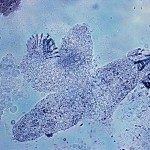Présentation
Amélie VANTAUX – Malaria Molecular Epidemiology Unit (Institut Pasteur du Cambodge) et Malaria Translational Research Unit (Institut Pasteur du Cambodge/Institut Pasteur Paris)
Since 2008, Cambodia is again the center of new emerging resistances, this time to artemisinin based treatments, basis of the main anti-malarial drug treatments (ACTs, Artemisinin-based combination therapies) actually recommended by the WHO. The evolution of P. falciparum resistance to anti-malarial drugs has been mostly investigated in human, although the mosquito vector, host of the sexual reproduction, plays a major role in the dissemination of resistant parasites. Indeed, ACTs are efficient against immature gametocytes (the human to mosquito transmission stage), but they do not impact mature sexual stages or young sequestered stages. In addition, the epidemiological context of South-East Asia is characterized by specific traits: symptomatic P. falciparum patients have a rather low gametocyte prevalence when assessed by molecular tools (ca. 40%). Accordingly, transmission to the mosquito vector is below 10%. Finally, many Plasmodium sp. infections are asymptomatic with very low parasitemia. However, data on the contribution of this reservoir of transmission in South-East Asia are sparse. Since Cambodia has entered a phase of malaria pre-elimination, a better characterization of malaria transmission to the mosquito vector is of paramount importance to implement adequate elimination programs.
To go a step further in the work of the Malaria Molecular Epidemiology Unit on following and understanding the evolutionary dynamics of anti-malarial drug resistances in humans, we are now investigating transmission to the mosquito vector. Indeed, since December 2014, we have set-up Anopheles dirus and Anopheles minimus mosquito colonies (two of the main malaria vectors in South-East Asia) in IPC insectaries as well as direct-membrane feeding assays (experimental infections of mosquitoes directly with patient’s blood) in the field to investigate malaria parasite transmission to the mosquito vector. During this talk I will present our results gathered over 78 P. falciparum symptomatic patients confirming the low infectivity of these patients, as well as the results from 2 two-months follow-ups of asymptomatic people carried out during the dry and the rainy seasons showing that on these small subsets (16 and 29 participants, for dry and rainy season respectively) only P. vivax infected participants were infectious to mosquito vectors.
Contact: Karin EIGLMEIER (karin.eiglmeier@pasteur.fr – Poste 39.26)

